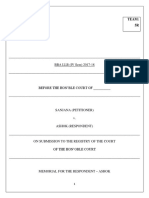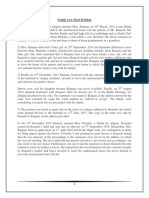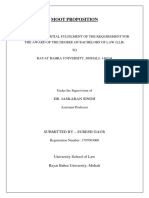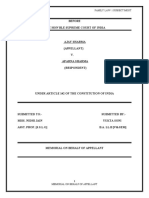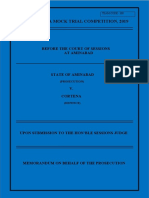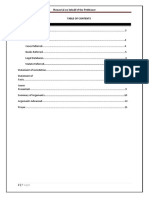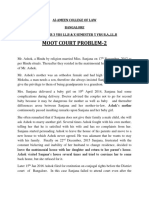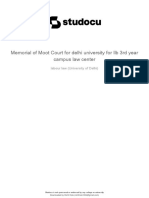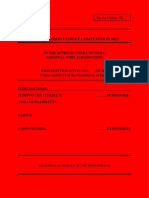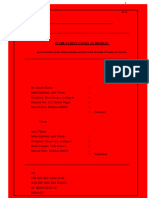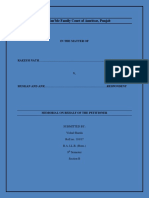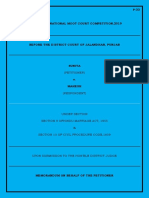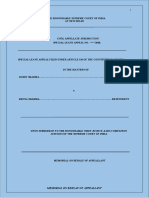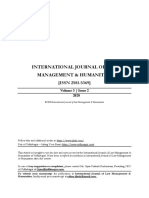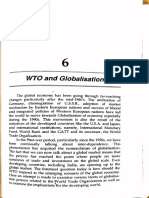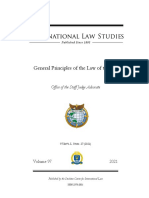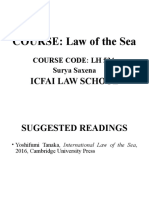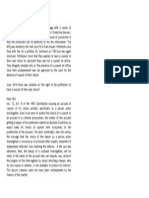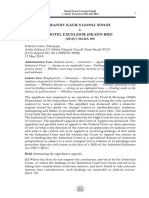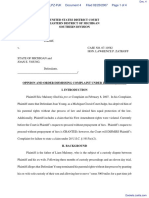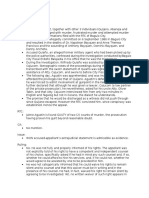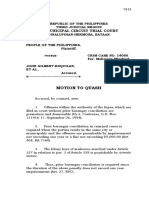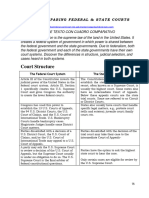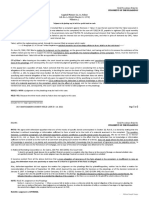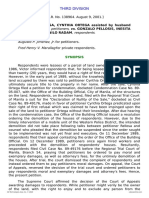Moot 2 Respondent
Moot 2 Respondent
Uploaded by
AmanOriginal Description:
Copyright
Available Formats
Share this document
Did you find this document useful?
Is this content inappropriate?
Report this DocumentCopyright:
Available Formats
Moot 2 Respondent
Moot 2 Respondent
Uploaded by
AmanCopyright:
Available Formats
1
IN THE HONOURABLE SUPREME COURT OF INDIA
AT NEW DELHI
CIVIL APPELLATE JURISDICTION
SPECIAL LEAVE APPEAL NO. ****/2020,
SPECIAL LEAVE APPEAL FILED UNDER ARTICLE 136 OF THE CONSTITUTION OF INDIA
IN THE MATTERS OF
ROHIT SHARMA……………………………….……………………………………………..APPELLANT
v.
REENA SHARMA………………………………………….……………………………….. RESPONDENT
UPON SUBMISSION TO THE HONOURABLE CHIEF JUSTICE & HIS COMPANION
JUSTICES OF THE SUPREME COURT OF INDIA
MEMORIAL ON BEHALF OF RESPONDENT
MEMORIAL ON BEHLAF OF RESPONDENT
2
TABLE OF CONTENTS
LIST OF ABBREVIATIONS………………………………………………………………3
LIST OF AUTHORITIES…………………………………………………………………..3
CONSTITUTION.......................................................................................................
ACTS & STATUTES.................................................................................................
BOOKS REFERRED ……………………………………………………………….
WEBSITES REFERRED..........................................................................................
LIST OF CASES....................................................................................................................4
STATEMENT OF JURISDICTION……………………………………………………… 5
STATEMENT OF FACTS………………………………………………………………… 6
ISSUE RAISED …………………………………………………………………………… 8
SUMMARY OF ARGUMENTS…………………………………………………………... 9
ARGUMENTSADVANCED………………………………………………………............ 10
PRAYER ……………………………………………………………………………………14
MEMORIAL ON BEHLAF OF RESPONDENT
3
LIST OF ABBREVIATIONS
v. Versus
AIR All India Report
SC Supreme Court
SCC Supreme Court Cases
Ors. Others
Anr. Another
HC High Court
SLP Special leave petition
LIST OF AUTHORITIES
CONSTITUTION
THE CONSTITUTION OF INDIA, 1950
ACTS & STATUTES
1. HINDU MARRIAGE ACT, 1954
BOOKS REFERRED
1. Dr. Paras Diwan, Modern Hindu Law (Allahabad Law Agency, 22nd edition).
WEBSITE PREFERRED
1. www.manupatrafast.in
2. www.scconline.com
3. www.supremecourtofindia.nic.in
MEMORIAL ON BEHLAF OF RESPONDENT
4
LIST OF CASES
1. Bhagat v. D. Bhagat, AIR 1994 SC 710
2. Gaurav Nagpal V. Sumedha Nagpal AIR 2009 SC 557
3. Krishna Banerjee v. Bhanu Bikash Bandyopadhya AIR 2001 Cal 154
4. Pritam Singh v. The State AIR 1950 SC 169
5. Samar Ghosh v. Jaya Ghosh, MANU/SC/1386/2007
MEMORIAL ON BEHLAF OF RESPONDENT
5
STATEMENT OF JURISDICTION
The Appellant has approached the Honourable SC of India through SLP under article 136 of
the Constitution of India. The matter has been listed for hearing. Article 136 of Constitution
of India read here as under:
Special leave to appeal by the SC
(1) Notwithstanding anything in this Chapter, the SC may, in its discretion, grant special
leave to appeal from any judgment, decree, determination, sentence or order in any cause or
matter passed or made by any court or tribunal in the territory of India
(2) Nothing in clause (1) shall apply to any judgment, determination, & sentence or order
passed or made by any court or tribunal constituted by or under any law relating to the Armed
Forces.
The memorandum for Appellant in the matters of ROHIT SHARMA V. REENA SHARMA
set forth the Facts, Contentions and Arguments present in the case.
MEMORIAL ON BEHLAF OF RESPONDENT
6
STATEMENT OF FACTS
The appellant husband, Rohit Sharma, has been unsuccessfully fighting litigation for the past
more than 12 years for breaking his marital ties with the respondent wife, Reena Sharma. The
appellant is double doctorate holder one in Physics from Delhi University and another from
France, and has been working in France during the relevant period. The respondent is a post-
graduate in Sociology and was working as a lecturer in the year 1990. The appellant came to
India in 1990 and gave advertisement in the newspaper seeking matrimonial alliance from a
suitable bride. The relatives of the respondent responded to the advertisement and there was
mutual consultation between the parties, which led to the marriage of appellant with the
respondent on 30.9.1990. After the marriage, the appellant and respondent stayed together for
someperiod and thereafter, the appellant left India for France. The respondent was asked to
join him after having obtained the visa and completing other formalities. The respondent,
after a period of six months, joined the appellant in France. It appears that the marital life of
the appellant and the respondent ran into rough weather from the very beginning of their stay
in France. There used to be occasional quarrel between the parties. A daughter, Radha, was
born to them on 10.6.1992. On 22nd June 1993, the appellant, respondent and their daughter
Radha came to India, but the appellant returned to France on 30th December 1993 itself and
the respondent joined him only on 10th may 1994. In February 1995, the respondent along
with her daughter returned to India and misunderstandings between the parties deepened and
ultimately the appellant filed application for divorce on 27th January, 1997 under section 13
of Hindu Marriage Act 1955alleging that after the solemnization of their marriage, the
respondent treated the appellant with cruelty.
The appellant alleged that the respondent entered into marriage with the appellant because of
the persuasion of her sisters and brother and the respondent was not taking any interest or co-
operating to have a happy married life. The appeallant alleged that the respondent joined him
in the France after a period of six months unwillingly, in March 1991 and the right from the
beginning of her life in France, she picked up quarrel with the appellant and created scenes
on many occassions. The appellant alleged that it was known to the Indian community,
MEMORIAL ON BEHLAF OF RESPONDENT
7
mainly to the people of Delhi, who had settle down in and around the area where the
appellant was residing, that the respondent was not having a good relationship with the
appellant. He also alleged that the respondent was not doing any household work and the
appellant had to do all work himself with his brother Ravi, who was staying with him, was
helping him. The appellant alleged that the respondent used to insult the appellant in the
presence of his friends and guests and that the respondent was taking no interest in sharing
bed with the appellant and this caused mental and physical agony to the appellant. The
respondent had denied all these allegations made by the appellant in the petition and she also
made counter-allegations. But it is pertinent to not that the respondent has no case that they
were having a happy married life and the attempt of the respondent was to put the blame at
the doorstep of the appellant. She stated that the appellant had no interest to live with the
respondent and was all time attending parties, watching TV and playing cards and the
respondent was completely neglected by the appellant.
The respondent also stated that she was not given proper medical aid when she was in labour
Pain and had to give pre-mature birth to the baby without any medical assistance, The
respondent contested the proceedings and denied all the allegations made by the appellant in
the petition and also made counter-allegations alleging that the appellant was responsible for
wrecking the marriage the marriage. Parties on either side examined witnesses to substantiate
their allegations. The learned Family Court Judge on 28th September, 1999 after assessing
the rival contentions and evidence adduced by the parties came to the conclusion that the
respondent had treated the appellant with mental cruelty and, therefore, the appellant was
entitled to get a decree for dissolution of marriage.
This was challenged by the respondent before the Hon’ble High Court of Delhi on 29th
October 1999 and the Division Bench of the High Court vide judgment dated 6th June 2003
reversed the decision of the Family Court holding that the appellant was at fault and he had
been trying to take advantage of his own wrongs, hence, he was not entitled to get a decree in
his favour in view of section 23(1) (a) of the Hindu Marriage Act.
On 1st July 2003 the judgement of the Division Bench was challenged before the Hon’ble
Supreme Court of India Argue the case on the behalf of the Appellant and Respondent before
the Hon’ble Supreme Court.
MEMORIAL ON BEHLAF OF RESPONDENT
8
ISSUES RAISED
1. WHETHER THE SPECIAL LEAVE PETITION IS MAINTAINABLE?
2. WHETHER THE ACT OF RESPONDENT AMOUNTS TO MENTAL
CRUELTY?
MEMORIAL ON BEHLAF OF RESPONDENT
9
SUMMARY OF ARGUMENTS
1. THE SPECIAL LEAVE PETITION IS NOT MAINTAINABLE?
In the present case, neither grave injustice was done nor does it involve any substantial
Constitutional question of law. Hence, the appellant has no grounds to approach this
Honourable court against the decision of the Honourable High Court of Calcutta,
Andaman and Nicobar Bench, under the Article 136 of the Constitution of India
2. THAT THE ACTIONS OF THE RESPONDENT DO NOT AMOUNT TO
MENTAL CRUELTY AND THUS A DECREE OF DIVORCE CAN’T BE
GRANTED UNDER SECTION 13 (1) (i a) OF THE HINDU MARRIAGE ACT
AS PLEADED BY THE APPELLANT
The acts of the respondent alleged by the appellant were not of such degree of cruelty that
Appellant’s life became miserable and hence marital tie be snapped. Additionally, those acts
were just ordinary wear and tear of the marriage and don’t amount to mental cruelty.
MEMORIAL ON BEHLAF OF RESPONDENT
10
ADVANCED ARGUMENTS
1. THE SPECIAL LEAVE PETITION IS NOT MAINTAINABLE?
It is humbly submitted before this honourable Court that Article 136 vests the Supreme Court
of India with a special power to grant special leave. It reads
“Notwithstanding anything in this Chapter, the Supreme Court may, in its discretion,
grant special leave to appeal from any judgment, decree, determination, sentence or
order in any cause or matter passed or made by any court or tribunal in the territory of
India”
The Honourable Supreme Court in a catena of judgements has pointed out that this special
discretionary power is granted to the Supreme Court to grant leave to appeal against any
judgment in case any substantial constitutional question of law is involved, or gross injustice
has been done. The Supreme Court of India may also refuse to grant the leave to appeal by
exercising its discretion. An aggrieved party from the judgment or decree of high court
cannot claim special leave to appeal as a right but it is a privilege which the Supreme Court
of India is vested with and this leave to appeal can be granted by it only.
The Honourable Supreme Court in Pritam Singh v. The State1 observed that “the Supreme
Court is vested wide discretionary power under Article 136 and this power is required to be
exercised sparingly and only in exceptional cases”. The Court also observed that “this Court
should not grant special leave, unless it is shown that “exceptional and special circumstance
exist”, that “substantial and grave injustice” has been done and the case in question presents
features of sufficient gravity to warrant a review of the decision appealed against”.
In the present case, neither an exceptional and special circumstance exist nor is the appellant
facing substantial and grave injustice due to the judgement of the Honourable High Court of
Calcutta.
Hence, it is most humbly requested before this honourable court appellant’s request to grant
special be rejected and the case be dismissed.
1
AIR 1950 SC 169
MEMORIAL ON BEHLAF OF RESPONDENT
11
2. THAT THE ACTIONS OF THE RESPONDENT DO NOT AMOUNT TO
MENTAL CRUELTY AND THUS A DECREE OF DIVORCE CAN’T BE
GRANTED UNDER SECTION 13 (1) (i) (a) OF THE HINDU MARRIAGE
ACT AS PLEADED BY THE APPELLANT.
It is humbly submitted to this Honourable Court that Marriage is a sacramental union, a holy
union between man and women and not a contractual union as per Hindu tradition. It is a
union which once tied cannot be untied. According to Manu, husband and wife are united to
each other not merely in this life but even after death, in the other world.
Section 13 of the Hindu Marriage Act 1955 defines the grounds for divorce and Section 13
(1)(i-a) specifically states that:
(1) Any marriage solemnised, whether before or after the commencement of this Act, may,
on a petition presented by either the husband or the wife, be dissolved by a decree of divorce
on the ground that the other party
(i-a) has, after the solemnisation of the marriage, treated the petitioner with cruelty
The term ‘Cruelty’ constitutes both acts of Physical and Mental cruelty. Even though the act
doesn’t define mental cruelty as such, the Apex court has in ample verdicts defined and
established the grounds for mental cruelty.
In Bhagat v. Bhagat,2 the Honourable Supreme Court defined Mental Cruelty as "that
conduct which inflicts upon the other party such mental pain and suffering as would make it
not possible for that party to live with the other. In other words, mental cruelty must be of
such a nature that the parties cannot reasonably be expected to live together”. It was further
stated that it “What is cruelty in one case may not amount to cruelty in another case. It is a
matter to be determined in each case having regard to the facts and circumstances of that
case. If it is a case of accusations and allegations, regard must also be had to the context in
which they were made.”
As alleged by the appellant, the respondent often misbehaved with the appellant that rough
weather from the very beginning of their stay in France or she picked up quarrel with the
appellant and created scenes on many occassions and that the respondent was not doing any
2
Bhagat v. D. Bhagat, AIR 1994 SC 710
MEMORIAL ON BEHLAF OF RESPONDENT
12
household work and the appellant had to do all work himself with his brother Ravi, who was
staying with him, was helping him and that the respondent used to insult the appellant in the
presence of his friends and guests
It is humbly requested in front of this Honourable the Court are false and that it would not be
justified in holding such an instance to be grounds sufficient enough to dissolve a marriage.
Smt. Krishna Banerjee v. Bhanu Bikash Bandyopadhya3 held that “The refusal to attend
the domestic work etc. cannot be in the ordinary circumstances, an instance of cruelty either
mental or physical” thus establishing the fact that this is not an act of mental cruelty.
In the Samar Ghosh case4, the Apex court laid fourteen illustrative but non exhaustive
guidelines to determine what acts constitutes mental cruelty. The relevant points i.e. point no
(iii), (viii), (ix) and (x) are as below:
(iii) “Mere coldness or lack of affection cannot amount to cruelty, frequent rudeness of
language, petulance of manner, indifference and neglect may reach such a degree that it
makes the married life for the other spouse absolutely intolerable.
(viii) The conduct must be much more than jealousy, selfishness, possessiveness, which
causes unhappiness and dissatisfaction and emotional upset may not be a ground for grant of
divorce on the ground of mental cruelty.
(ix) Mere trivial irritations, quarrels, normal wear and tear of the married life which happens
in day-to-day life would not be adequate for grant of divorce on the ground of mental cruelty.
(x) The married life should be reviewed as a whole and a few isolated instances over a period
of years will not amount to cruelty. The ill conduct must be persistent for a fairly lengthy
period, where the relationship has deteriorated to an extent what because of the acts and
behaviour of a spouse, the wronged party finds it extremely difficult to live with the other
party any longer, may amount to mental cruelty.”
The acts of the respondent are not so serious in nature. They don’t constitute to Mental
cruelty as defined by the Honourable Court in the Samar Gosh judgement (supra). They are
trivial irritations, normal wear and tear of the marriage life and do not account to amount to
mental cruelty. One off instances here and there during the course of marriage doesn’t lead to
mental cruelty.
3
AIR 2001 Cal 154
4
Samar Ghosh v. Jaya Ghosh, MANU/SC/1386/2007
MEMORIAL ON BEHLAF OF RESPONDENT
13
In Gaurav Nagpal V. Sumedha Nagpal,5 the Honourable Supreme Court indicated that
“Effort should be to bring about conciliation to bridge the communication gap which leads to
such undesirable proceedings. People rushing to courts for breaking up of marriage should
come as a last resort, and unless it has an inevitable result, courts should try to bring about
conciliation. The emphasis should be on saving marriage and not breaking it."
Hence, it is most humbly submitted before this honourable court that the actions of the
respondent considered separately or cumulatively, do not amount to mental cruelty and hence
decree for divorce can’t be granted on the same grounds and not in the favour of the
appeallant.
PRAYER
Wherefore, in the lights of facts stated, issues raised, authorities cited & arguments
5
AIR 2009 SC 557
MEMORIAL ON BEHLAF OF RESPONDENT
14
advanced, it is most humbly prayed & implored before the Hon’ble Court, that it may be
graciously pleased to adjudge & declare –
1. Reject the appellant’s plea for the grant of Special Leave under Article 136 of the
Constitution of India.
2. Reject the appellant’s prayer for decree of Divorce under Section 13 (1) (i a) of the
Hindu Marriage Act, 1955 and uphold the judgement passed by the Honourable
High Court
& Pass any other Order, Direction, or Relief that it may deem fit in the Best
Interests of Justice, Fairness, Equity & Good Conscience. For This Act of
Kindness, the Appellant Shall Duty Bound Forever Pray.
Date: 23/11/2020
Place: NEW DELHI (Counsel for the Respondent)
MEMORIAL ON BEHLAF OF RESPONDENT
You might also like
- Sample Complaint For ReplevinDocument5 pagesSample Complaint For ReplevinNinya Saquilabon100% (2)
- Mercy PetitionDocument4 pagesMercy PetitionPrasun TiwariNoch keine Bewertungen
- New Final Memorial PDFDocument16 pagesNew Final Memorial PDFGowri100% (1)
- CRPC 374 Moot Court Respondent SideDocument18 pagesCRPC 374 Moot Court Respondent SideVaibhav Pawar100% (1)
- Memorial On Behalf of The Respondent!!Document17 pagesMemorial On Behalf of The Respondent!!Abhineet Jha100% (1)
- Annexure 1 Moot Problem IDocument3 pagesAnnexure 1 Moot Problem ILatest Laws Team50% (6)
- Mumbai Memorial AppellantDocument27 pagesMumbai Memorial Appellantpranav100% (3)
- Moot MemorialDocument25 pagesMoot Memorialaayushi pandeyNoch keine Bewertungen
- Moot Court Memorial For Respondant Related To Acid AttackDocument27 pagesMoot Court Memorial For Respondant Related To Acid AttackSuhail0% (1)
- Family Law Moot ProblemDocument1 pageFamily Law Moot Problemaditya yadav100% (2)
- MEMORIALDocument17 pagesMEMORIALBhumika M ShahNoch keine Bewertungen
- MootDocument15 pagesMootSuresjNoch keine Bewertungen
- Memorial (Appellant)Document14 pagesMemorial (Appellant)Yukta SoniNoch keine Bewertungen
- Petitioner MemorialDocument27 pagesPetitioner MemorialGowthami NalluriNoch keine Bewertungen
- 3RD Kiit Intra Mock Trial Competition PDFDocument26 pages3RD Kiit Intra Mock Trial Competition PDFarchita nayak100% (1)
- Raghavendra Phadnis Moot 2013 - Problems PDFDocument9 pagesRaghavendra Phadnis Moot 2013 - Problems PDFUNIVERSITY LAW COLLEGE BHUBANESWARNoch keine Bewertungen
- Petitioner PB FINAL - Moot 1Document12 pagesPetitioner PB FINAL - Moot 1Poonam BansalNoch keine Bewertungen
- Moot Memorial Respondent BackupDocument11 pagesMoot Memorial Respondent BackupMaharishi VaidyaNoch keine Bewertungen
- BCI - MOOT - AppellantDocument13 pagesBCI - MOOT - AppellantAbiNoch keine Bewertungen
- R 12Document21 pagesR 12varun100% (1)
- Mrs. Akella Lalitha v. Sri Konda Hanumantha Rao & AnrDocument4 pagesMrs. Akella Lalitha v. Sri Konda Hanumantha Rao & AnrmituchituNoch keine Bewertungen
- Memorial Petitioner SideDocument25 pagesMemorial Petitioner Sidegeethu sachithanandNoch keine Bewertungen
- Priya Criminal Moot Court NewDocument20 pagesPriya Criminal Moot Court NewKRISHNA MARATHE100% (1)
- PetitionerDocument14 pagesPetitionertriptii100% (1)
- Ashok V.S SanjanaDocument3 pagesAshok V.S Sanjanagowri0% (2)
- Memorial of Moot Court For Delhi University For LLB 3rd Year Campus Law CenterDocument22 pagesMemorial of Moot Court For Delhi University For LLB 3rd Year Campus Law CenterSakshi ShindeNoch keine Bewertungen
- Same Sex Marriage Petition - Respondent SideDocument17 pagesSame Sex Marriage Petition - Respondent Sideansh100% (1)
- Respondent FinalDocument15 pagesRespondent FinalPoonam BansalNoch keine Bewertungen
- Petitoner DDocument18 pagesPetitoner DPoonam BansalNoch keine Bewertungen
- Compulsory Moot - VishalDocument18 pagesCompulsory Moot - Vishaldishu kumar100% (1)
- Intra Moot RespondentDocument19 pagesIntra Moot RespondentAman D Sharan100% (2)
- Moot Court MemorialDocument15 pagesMoot Court MemorialMohammad Shah MominNoch keine Bewertungen
- Dr. Ambedkar Law University, Chennai P-33Document27 pagesDr. Ambedkar Law University, Chennai P-33Samraddhi SohaniNoch keine Bewertungen
- Memorial To MootDocument23 pagesMemorial To MootNITISH SHARMANoch keine Bewertungen
- Appellant FinalDocument16 pagesAppellant FinalPoonam BansalNoch keine Bewertungen
- Memorial Group2Document22 pagesMemorial Group2Littz MandumpalaNoch keine Bewertungen
- Memorial For Appellant (1750101)Document17 pagesMemorial For Appellant (1750101)AMRUTH ANAND 175040867% (3)
- Nazar MemorialDocument24 pagesNazar Memorialsiddhant sharma100% (1)
- Moot MemorialDocument19 pagesMoot MemorialAkash A M100% (2)
- Moot MemorialDocument8 pagesMoot MemorialNikita GuptaNoch keine Bewertungen
- Respondent Team FL 04Document26 pagesRespondent Team FL 04saransh yadavNoch keine Bewertungen
- IPC Memo (Vishwanath v. State of UP - Appellant)Document14 pagesIPC Memo (Vishwanath v. State of UP - Appellant)Abhimanyu0% (1)
- Memorial - FL 06 - PetitionerDocument23 pagesMemorial - FL 06 - PetitionerAnay MehrotraNoch keine Bewertungen
- Appellant MemorialDocument31 pagesAppellant MemorialSrishti Punj0% (1)
- Moot Court and InternshipDocument13 pagesMoot Court and InternshipPiyush RanjanNoch keine Bewertungen
- TC 008 - AppellantDocument26 pagesTC 008 - AppellantRISHI SHARMANoch keine Bewertungen
- 0 - 1601998074625 - Final Moot Memo.Document14 pages0 - 1601998074625 - Final Moot Memo.Littz MandumpalaNoch keine Bewertungen
- Moot Problem - 01 - Appellant SideDocument6 pagesMoot Problem - 01 - Appellant Sidesaloni bungNoch keine Bewertungen
- Zeal Moot FinalDocument23 pagesZeal Moot FinalJay Tamakuwala100% (3)
- Intra Moot Respondent MemorialDocument20 pagesIntra Moot Respondent MemorialHeena Shaikh0% (1)
- MOHD. HANIF QUARESHI and OTHERS V STATEDocument18 pagesMOHD. HANIF QUARESHI and OTHERS V STATEpernaNoch keine Bewertungen
- FL 06 PetitionerDocument25 pagesFL 06 PetitionerAayushiNoch keine Bewertungen
- Moot Court Criminal AppellantDocument11 pagesMoot Court Criminal AppellantRikar Dini BogumNoch keine Bewertungen
- Kle Moot Court CompetitionDocument10 pagesKle Moot Court CompetitionAds Company100% (1)
- Kartavya, Celebration of 70 Constitution Day Moot CompetitionDocument27 pagesKartavya, Celebration of 70 Constitution Day Moot CompetitionWoke Millennials100% (4)
- Emorial On The Behalf of RespondentDocument24 pagesEmorial On The Behalf of Respondentprakash100% (1)
- Moot 2 AppeallantDocument17 pagesMoot 2 AppeallantAmanNoch keine Bewertungen
- Before: Section 13 of Hindu Marriage Act in The Matter ofDocument17 pagesBefore: Section 13 of Hindu Marriage Act in The Matter ofAshwina NamtaNoch keine Bewertungen
- Moot Court 1 10th (Repaired)Document24 pagesMoot Court 1 10th (Repaired)Dharamjeet SinghNoch keine Bewertungen
- Arnesh Kumar vs. State of BiharDocument15 pagesArnesh Kumar vs. State of BiharAISHWARYA JADHAVNoch keine Bewertungen
- PetitionerDocument21 pagesPetitionerCrazy Mechons100% (2)
- Jeba Moot NewDocument22 pagesJeba Moot Newvinodhini aNoch keine Bewertungen
- The International Criminal Court Its Success and Limitations For Pursuinginternational Justice 2169 0170 1000180Document6 pagesThe International Criminal Court Its Success and Limitations For Pursuinginternational Justice 2169 0170 1000180AmanNoch keine Bewertungen
- Client CounsELLING IDocument6 pagesClient CounsELLING IAmanNoch keine Bewertungen
- Aman LabourDocument10 pagesAman LabourAmanNoch keine Bewertungen
- Taxation SyllabusDocument2 pagesTaxation SyllabusAmanNoch keine Bewertungen
- Right To Sleep As A Fundamental Right An Analysis Vis À Vis The Ramlila Maidan Case'Document11 pagesRight To Sleep As A Fundamental Right An Analysis Vis À Vis The Ramlila Maidan Case'AmanNoch keine Bewertungen
- 7 Charity, Trust - CPC IIDocument15 pages7 Charity, Trust - CPC IIAmanNoch keine Bewertungen
- Moot 2 AppeallantDocument17 pagesMoot 2 AppeallantAmanNoch keine Bewertungen
- Ramji Lal Modi v. State of Uttar PradeshDocument6 pagesRamji Lal Modi v. State of Uttar PradeshAmanNoch keine Bewertungen
- Moot 1 ApplealntDocument30 pagesMoot 1 ApplealntAmanNoch keine Bewertungen
- Land Law PPT2Document17 pagesLand Law PPT2AmanNoch keine Bewertungen
- Joseph Shine v. UoIDocument5 pagesJoseph Shine v. UoIAmanNoch keine Bewertungen
- Land Law PPT 1Document8 pagesLand Law PPT 1AmanNoch keine Bewertungen
- Long BrochureDocument30 pagesLong BrochureAmanNoch keine Bewertungen
- Land Law PPT 4Document12 pagesLand Law PPT 4AmanNoch keine Bewertungen
- WTO & GlobalisationDocument12 pagesWTO & GlobalisationAmanNoch keine Bewertungen
- Judicial Interpretation of Unsoundness of Mind1Document10 pagesJudicial Interpretation of Unsoundness of Mind1AmanNoch keine Bewertungen
- CPC Assignment 1Document14 pagesCPC Assignment 1AmanNoch keine Bewertungen
- General Principles of The Law of The SeaDocument13 pagesGeneral Principles of The Law of The SeaAmanNoch keine Bewertungen
- COURSE: Law of The Sea: Course Code: LH 534 Surya SaxenaDocument156 pagesCOURSE: Law of The Sea: Course Code: LH 534 Surya SaxenaAmanNoch keine Bewertungen
- Sia Vs PeopleDocument1 pageSia Vs PeopleJelyn Delos Reyes TagleNoch keine Bewertungen
- Applic For Certificate of OrderDocument4 pagesApplic For Certificate of OrderbeluswataNoch keine Bewertungen
- Lovett v. LaManna, 4th Cir. (2006)Document2 pagesLovett v. LaManna, 4th Cir. (2006)Scribd Government DocsNoch keine Bewertungen
- Wake County Circuit Court Rules in Redistricting ChallengeDocument260 pagesWake County Circuit Court Rules in Redistricting ChallengeFOX8Noch keine Bewertungen
- Ranjit Kaur S Gopal Singh V Hotel ExcelsiorDocument11 pagesRanjit Kaur S Gopal Singh V Hotel ExcelsiorIreneNoch keine Bewertungen
- COMPLAINT - Durante v. Gasyon and EgatorDocument20 pagesCOMPLAINT - Durante v. Gasyon and EgatorAJ FHNoch keine Bewertungen
- Maloney v. State of Michigan Et Al - Document No. 4Document4 pagesMaloney v. State of Michigan Et Al - Document No. 4Justia.comNoch keine Bewertungen
- 46 in The Matter of Estate of Telesforo de Dios - Case DIgestDocument3 pages46 in The Matter of Estate of Telesforo de Dios - Case DIgestGoodyNoch keine Bewertungen
- Delete ThisDocument2 pagesDelete ThisFairview Barangay BaguioNoch keine Bewertungen
- United States v. Robert F. Tierney, 760 F.2d 382, 1st Cir. (1985)Document12 pagesUnited States v. Robert F. Tierney, 760 F.2d 382, 1st Cir. (1985)Scribd Government DocsNoch keine Bewertungen
- Suit For Recovery Against NeelkanthDocument12 pagesSuit For Recovery Against Neelkanthprashant100% (1)
- People Vs AgustinDocument2 pagesPeople Vs AgustinKristine GarciaNoch keine Bewertungen
- Motion To QuashDocument3 pagesMotion To QuashTazurc TomNoch keine Bewertungen
- People v. SalvatierraDocument11 pagesPeople v. SalvatierraBianca BNoch keine Bewertungen
- Comparing Federal & State CourtsDocument2 pagesComparing Federal & State Courtsmiguez871Noch keine Bewertungen
- Advincula V AdvinculaDocument3 pagesAdvincula V AdvinculaPEMS Ivan Theodore P LopezNoch keine Bewertungen
- Texas v. US - Order On Motion To InterveneDocument8 pagesTexas v. US - Order On Motion To IntervenejoshblackmanNoch keine Bewertungen
- Alimpos v. CA (Digest)Document2 pagesAlimpos v. CA (Digest)Kimberly OmlangNoch keine Bewertungen
- Dhananjay Shanker Shetty Vs State of Maharashtra - 102616Document9 pagesDhananjay Shanker Shetty Vs State of Maharashtra - 102616Rachana GhoshtekarNoch keine Bewertungen
- United States v. The M/V Zoe Colocotroni, Etc., 602 F.2d 12, 1st Cir. (1979)Document5 pagesUnited States v. The M/V Zoe Colocotroni, Etc., 602 F.2d 12, 1st Cir. (1979)Scribd Government DocsNoch keine Bewertungen
- CGA V IgnacioDocument2 pagesCGA V IgnacioboyetverzosaNoch keine Bewertungen
- (DLB) (PC) Janoiko v. Cox - Document No. 3Document2 pages(DLB) (PC) Janoiko v. Cox - Document No. 3Justia.comNoch keine Bewertungen
- Dioquino V Cruz - Full CaseDocument5 pagesDioquino V Cruz - Full CasenaldsdomingoNoch keine Bewertungen
- R34-01 Capitol Motors vs. YabutDocument2 pagesR34-01 Capitol Motors vs. YabutMichael JosephNoch keine Bewertungen
- Sunga Vs Lacson 1968Document3 pagesSunga Vs Lacson 1968M Azeneth JJNoch keine Bewertungen
- Evidence Outline - FinalDocument28 pagesEvidence Outline - FinalAlexandra KovalioukNoch keine Bewertungen
- Rellosa vs. Pellosis PDFDocument6 pagesRellosa vs. Pellosis PDFD MonioNoch keine Bewertungen
- No Answers Legal Ethics Bar Questions 2006-2014Document88 pagesNo Answers Legal Ethics Bar Questions 2006-2014Diane Dee YaneeNoch keine Bewertungen


